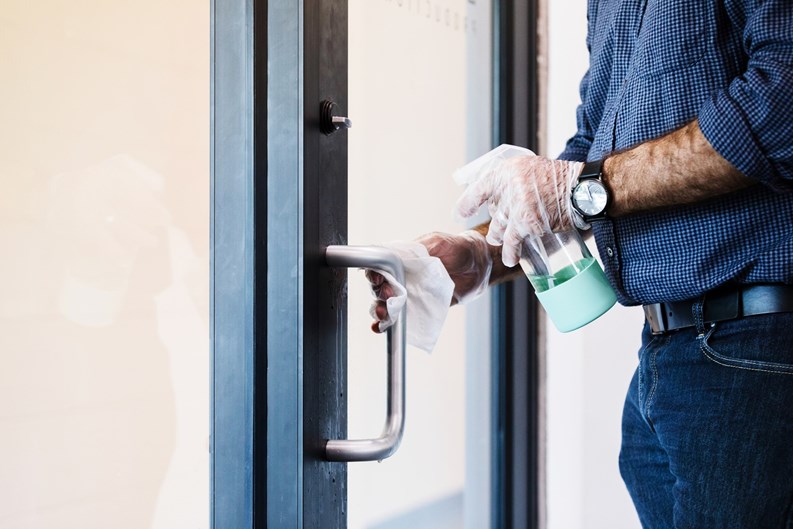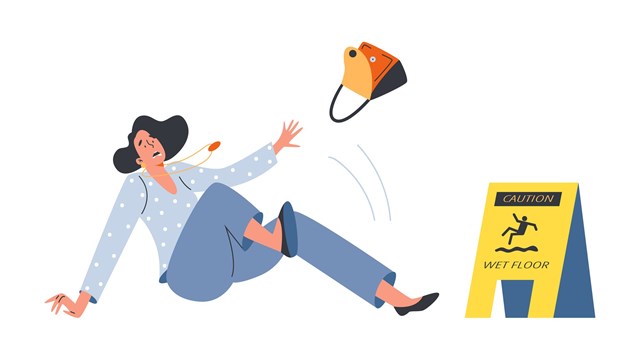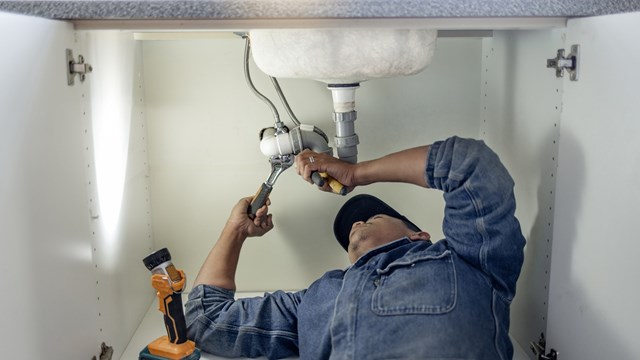While residents of condos, co-ops, and HOAs do their part to prevent the spread of COVID-19 by staying in their homes as much as they can, they rely on the supers, porters, valets, doorpeople, janitorial workers, handymen and -women, security personnel, managerial staff, maintenance workers, and others to leave their homes to keep these multifamily communities safe, clean, and operational.
But over these last six months, as the world has been in the grips of the coronavirus crisis, property service workers around the country have been dealing with heavier and more intense workloads, ever-shifting regulations, and supply line shortages making it harder to carry out their essential duties—all while dealing with the same fear and uncertainty that this virus and its outcomes have inflicted on all of us.
Meanwhile, boards and property managers have been adjusting to new governance procedures; incorporating the shifting regulatory guidance from multiple levels of government into their policies; dealing with pressure from residents to reopen amenities; and figuring out how to incorporate personal protective equipment (PPE), foggers, gallons of disinfectant, and plexiglass partitions into budgets that in many cases were already tight. Given all of these challenges—and in light of the tough, important work that they do for the communities they serve—it is more important than ever to ensure that property workers continue to feel safe, secure, and supported.
In the Beginning
At the beginning of the coronavirus crisis, The South Florida Cooperator spoke to Carolina González, New York regional communications manager for 32BJ SEIU, the largest property workers union in the country. She explained that in New York, there were early agreements with the Realty Advisory Board (RAB) to extend sick pay for workers, incorporate guidance from the Centers for Disease Control and Prevention (CDC) for employee protection, and allow flexible staffing in order to employ workers laid off from buildings in the commercial or office sector, or to fill shortages where staff needed to quarantine after exposure to or contraction of the virus, or if they had underlying health concerns and were therefore staying home or isolated.
According to González, while most 32BJ members working in residential properties were happy to be employed at a time when millions of other Americans were losing their jobs, they still had to contend with the risks of contracting and spreading the virus on their commute to and from work—which by and large involved either public transportation or carpooling, at a time when mask wearing and social distancing had not become municipally mandated. And their risks didn’t end when they got to work: as states and municipalities locked down in the spring, PPE was in woefully short supply, residents who were normally at work or school were now confined to the buildings, and official guidance was sparse and inconsistent, to say the least.
Although there was “a lot of mental and emotional strain [on] the guys” at the time, González expressed that the closeness of residential building employees’ relationships with those who live in and operate their workplaces gave many workers the motivation to maintain the “continuity of service” that their jobs require. And across the nation, many boards, residents, and managers offered accommodation and appreciation to their property service workers with free parking (made available when many owners with cars fled urban apartments for more spacious and isolated living situations), hot meals, evening applause, and PPE donations.
At The Residences at Pier 4 in Boston, for example, general manager Jeremy DiFlaminies with FirstService Residential enlisted his wife to sew upwards of 60 masks for building staff. Residents of Seward Park Cooperative in lower Manhattan organized a fund to provide meals to staff under a partnership with the co-op’s commercial tenant restaurants—thereby supporting local businesses, keeping their own commercial tenants afloat, and offering appreciation to their hard-working building employees in one fell swoop. And in Miami, a group of condo boards called the Brickell Alliance organized two first-responders appreciation events with banners and a parade of cars honking for the police, firefighters, EMTs, and their own building service workers on the front lines of the pandemic.
A Unified Approach
According to Brickell Alliance president Marta Arnold, who serves on the board of The Palace condo building, her board worked with their management company, KW Property Management & Consulting, to make proactive decisions at the onset of the coronavirus crisis. She says that since certain workers at the condo’s three towers—including front desk, security rovers, and gate personnel—are employees of KW, while others—like valet and cleaning staff—are subcontracted from outside vendors, it was important to line up protocols and procedures to “make sure that everyone is on the same page.”
After the Alliance pressed upon the city of Miami the importance of designating building service workers as ‘essential’ employees that could continue to go to work in the event of shut-downs or curfews, they were able to come up with unified regulations and guidelines to share among the condos. Even though the 20 or so buildings in the Alliance have different structures, populations, and facilities, approaching the ever-changing landscape of the crisis cooperatively proved effective in encouraging compliance and fostering a sense of assurance—from both residents and staff of the buildings.
Arnold says that the Alliance’s function was especially important given the dearth of initial guidance from the government. Even when local protocols did start to trickle in, Florida’s statewide mandates might differ from Miami’s, which in turn might differ from Miami-Dade county’s. With an already uncertain and tumultuous environment to deal with—and with the stakes extremely high—unifying the boards’ position on particular decisions allowed both staff and residents to align expectations and mitigate some of the second-guessing and confusion surrounding their state’s coronavirus response.
Enhanced Protocols, New Responsibilities
One issue common among multifamily buildings and communities is what’s become known as the ‘package problem.’ Already a growing concern pre-COVID, dealing with the onslaught of home deliveries from Amazon, UPS, FedEx, Fresh Direct, and innumerable meal delivery and meal-prep services during lockdown, while considering the potential for contagion and complying with differing building protocols, has made the package problem the universal bane of building service workers. Some buildings have developed complex systems for receiving and decontaminating packages; others have put restrictions on types and methods of deliveries; still others have made physical alterations to their common spaces to accommodate the package pile-up. But regardless of how each building is handling the issue, it’s usually the building workers who are left holding the bag … or more accurately, the box.
Both González and Arnold indicate that dealing with deliveries has been an added stress for staff. For some, it’s yet another task in their already long list of responsibilities. For others, it’s outside of their job description, requiring them to learn a new set of protocols. But in the pandemic era, property workers have needed to ping-pong between roles, be flexible with their shifts, and fill in for others at the drop of a hat. Janitors used to mopping and dusting now must learn how to use foggers and CDC-approved disinfectants. A doorman who normally just signs visitors in and directs them to the elevator is now policing mask-wearing and taking temperatures. When The Palace had to shut down the condo’s valet service after two employees tested positive for COVID-19, the remaining workers were put into different buildings roles (after requisite quarantining and negative test results); Arnold remembers with a chuckle how one valet transitioned to the role of pool security after that amenity reopened to limited resident-only use: “On day one, he was in his long black pants, black button-down, black shoes [that he wore as a valet]. On day two, he had on khakis, a white polo, and sneakers. … By day five, he was in a t-shirt, casual shorts, and flip-flops.” So adapting to new roles can be a matter of wardrobe adjustment, too.
In other cases, new responsibilities emerge in less quantifiable—and less lighthearted—ways. Jim Stoller, president and CEO of property management firm The Building Group (TBG) in Chicago, speaks of the effects that prolonged isolation, uncertainty, and fear can have on a residential population. “We’ve had some residents,” he says, “who have been somewhat abusive to the staff, and it’s quite unfortunate. You know, people who’ve been inside their condominium or co-op for weeks or sometimes longer [can become] very needy in ways that building management is not really licensed to address. In many cases they were not able to receive therapy or get the help that they needed, so unfortunately the building staffs have had to deal with these issues.”
Stoller also mentions the fear and uncertainty surrounding the escalating social unrest in his city and elsewhere, which can have broader implications for those who are not isolated in their homes. “In many cases,” he says, “[staff members] are coming across the city to get to work—and in many cases they’re taking public transportation to get to their jobs. They’re traveling at night and on weekends, and we have to ensure their safety and well being also. It has created a stressful environment for the people who have been working—and, in so many cases, been doing an amazing job. These people have really stepped up and have really showed that they care a great deal about the buildings they work at.”
Showing Support
With all of these added responsibilities, heightened health and safety concerns, increased resident presence, and raised expectations for staff, it begs the question: Along with verbally expressing their thanks, what can the boards and residents of multifamily buildings and communities do to show appreciation and support for their property’s workers? Our experts gave us some actionable recommendations:
• “One thing residents can do is to just be aware of protocols and follow them,” says González of 32BJ when we spoke again for this article. It seems simple enough, but as we all know, people are not always respectful of rules, limits, and even visible barriers. When you see the tape around the doorperson or security desk, keep that six foot distance—and wear your mask in all common areas of your building or community at all times. Don’t expose your building staffers to unnecessary risk—and don’t put them in the position of having to remind you of rules that should be second nature by now.
• Arnold stresses that responsibility for the well-being of staff is among the governance duties of residential boards, and says that clear, unambiguous messaging—like posting policies in common areas and instituting fines for disregarding them—help to empower staff to make sure that residents are complying with health and safety protocols, which in turn helps them feel more comfortable about their own safety on the job.
• Managers DiFlaminies and Stoller both indicate that encouraging staff to take time off is a good way to support their well being, both in the physical sense as well as the mental and emotional. Giving workers extra PTO (if their paid time off is not stipulated by a union contract) not only promotes goodwill—it also goes a long way toward allaying health concerns and promoting stability and security in the workforce.
An additional way to support property workers is to pressure the federal government to give them hazard pay for the essential work they have been performing over the last half a year. As Louis deJesus, a 32BJ union member who has worked as a doorman in a building in Manhattan’s Upper West Side for the last 25 years, said in a press release on the subject: “the best ‘thank you’ is to be paid for your essential work and have job protection.”
And finally, for your building staff and for the planet—try to consolidate all those Amazon orders!
Darcey Gerstein is Associate Editor and a Staff Writer for The South Florida Cooperator.







Leave a Comment